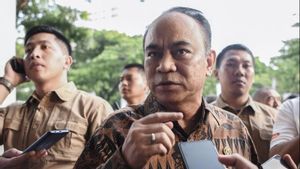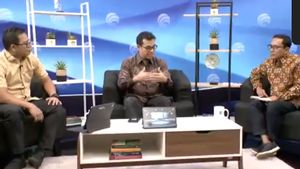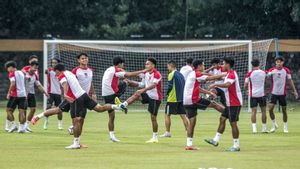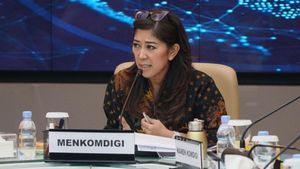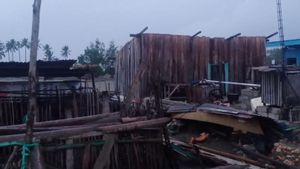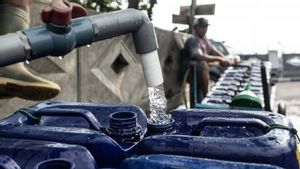JAKARTA - The world of journalism and Indonesian media has gained fresh air and hope, in the midst of the "sunset" of the media ecosystem due to the impact of today's technological disruption. Some conventional media have been forced to adapt by turning their media platforms into online media. However, online media are also having difficulty supporting themselves because of the ad niche previously relied on by the media, most of which are dredged up by giant digital platforms such as Google, Metta, Microsoft, Apple and Amazon. The hegemony of digital giants such as Google, Facebook and Instagram in the Metta group is what the government wants to bridge by issuing Presidential Regulation (Perpres) Number 32 of 2024 concerning the Responsibility of Digital Platform Companies to Support Quality Journalism.
According to the Deputy Minister of Communication and Information, Nezar Patria, the arrangement will be one of the keys to the future guarantees of quality Indonesian journalism. Nezar added that this Presidential Regulation was designed to create a framework that would allow both parties to negotiate and reach mutually beneficial business agreements, he said in a Kominfo press release, early March.
Perpres 32 Tahun 2024, dijelaskan Wamen mengatur dua tujuan utama yakni mendukung journalistik yang berkualitas, serta menjaga sustainability media atau keberlangsungan industri media. "Untuk mendukung dua poin penting itu perpres ini mengatur detail-detailnya," katanya.
To support platform quality journalism, digital is obliged to facilitate content that distribution must be in accordance with the Press Law or Law 40 of 1999, also providing the best in designing algorithms that provide a place for quality journalism. For the sustainability of the media, it is regulated there about profit-sharing agreements, paid licenses, aggregate data sharing, and other forms of cooperation, between publishers and digital platforms working together to make a be to be agreement.
According to the Deputy Minister to address other issues, for example, regulating relations between digital platforms and press companies, the Perpres mandates the formation of an independent body in the form of a Committee. The committee was formed by the Press Council, with a composition of 5 people coming from the Press Council, 5 people from experts who are not affiliated with press companies and digital platforms and 1 representative from the government.
SEE ALSO:
"This committee will supervise and fulfill the obligations of digital companies, recommend implementing government affairs in the field of communication and informatics to ministers, and mediating disputes between digital companies and press companies," Nazar explained in an Interview with Voi.
The implementation must be mentioned within 6 months of being signed. However, according to Nezar, there are some publishers who have made a B to B agreement and made a business deal between them, they are welcome to walk without having to wait 6 months.
"This Presidential Regulation only regulates commercialized news content, which does not apply to content creators or content on Youtube, not included in the framework regulated by this regulation", said Nezar, during an interview with Voi, at the end of February.
The establishment of this Presidential Regulation began with President Jokowi's concern during the commemoration of National Press Day in Banjarmasin, South Kalimantan, February 9, 2020, regarding the fate and sustainability of the media and press companies, due to the dominance of digital platforms. So then the president asked the press community to propose a draft regulation which was later called a public gathering. At that time his enthusiasm resulted in a draft law.
At the president's request for the formation of the regulation, the formation of the Media Sustainability team was developed based on a Press Council Decree (SK). From the discussion of the Sustainability Media Team, the draft Publisher Rights regulation or the publisher rights, which at that time was entitled Responsibility for Quality Digital Platforms and Journalism. The draft regulation was then submitted to the then Minister of Communication and Information, Johnny G Plate.
The Minister of Communication and Information then submitted the draft Publisher Rights regulation to the Coordinating Minister for Political, Legal and Security Affairs to be explored for the possibility of being included in the revision of the Electronic Information and Transactions Law (ITE). However, according to the Director General of Information and Public Communication of the Ministry of Communication and Information, Usman Kansong, in the process the regulation was not possible to be included in the revision of the ITE Law.
So that the Deputy for Law for the Cabinet Secretariat provides input so that the draft draft is included in the regulation in the form of a Government Regulation or Presidential Regulation. During the commemoration of the 2022 National Press Day in Kendari, Southeast Sulawesi, the President asked the press to agree to include the regulation into law, revision of laws, or government regulations.
To follow up on the direction of the President of the Minister of Communication and Information to gather the Press Council and constituents to discuss the form of the regulation. And it was agreed that regulations in the form of Government Regulations, but further discussions developed that form of regulation would be in the form of a Presidential Regulation (Perpres) taking into account the speed of state attendance.
Furthermore, on the advice of the Deputy for Law of the Cabinet Secretariat, Draft was refined by legal standard drafting, involving a consultant from the Faculty of Law, Padjadjaran University. The Ministry of Communication and Information then sent the draft to the State Secretariat (Setneg) but the State Secretariat returned the Draft, Kominfo was asked to complete the required documents, including draft documents that had gone through discussions by the Ministry of Communication and Information. So that the Ministry of Communication and Information formed a team of draft Presidential Decree with ministries/agencies, such as the Ministry of Law and Human Rights, Setkab, Setneg, and Kemenkopolhukam and digital platforms.
According to Usman, in drafting the Kominfo Presidential Regulation, the principle of press independence is very important. The contents of the Presidential Decree are the obligation to cooperate. So, digital platforms must cooperate with the media in Indonesia in distributing and utilizing news. "What is regulated in the draft is the cooperation between digital platforms and press companies," he said.
Defending Presidential Decree Publisher Right
According to the Executive Director of the ICT Institute, Heru Sutadi, the government remains consistent in maintaining the press release right. "The movement is normal. Such resistance is common everywhere. Digital companies have also rejected the implementation of PSE registration (Electronic System Operators), they objected, because there are consequences, especially regarding taxation. In many countries they avoid taxes, if they can avoid taxes but take large financial resources," he said during the CNBC Indonesia dialogue, last March 6.
Heru believes that the social media company will count Indonesia's market potential with 112 million users, with the potential for advertising revenue reaching trillions of rupiah.
The same statement was conveyed by an Indef economist, Nailul Huda, who said that the giant social media platform would definitely count the possibility of losing potential revenue if they left Indonesia. Indonesian users are quite large as a market.
So far there has been no definite stance from digital giants like Google and other platforms regarding the enactment of the Presidential Decree Publisher Rights by the Indonesian government. But Google Indonesia Communications Manager Feliciana Wienathan said, "We understand the Government has ratified regulations on news publishers, and we will immediately study the details. So far, we have worked with news publishers and the Government to support and build a future for a sustainable news ecosystem in Indonesia. It is very important for our product to be able to present news and diverse perspectives without prejudice and bias," he wrote answering Voi's question via an electronic letter.
So, he added, in this joint effort, we always emphasize the need to ensure that Indonesians have access to diverse news sources, and also the need to strive for a balanced news ecosystem in Indonesia - "That is, an ecosystem that can produce quality news for everyone, as well as enable all news publishers, both big and small, to develop." he wrote again.
The English, Chinese, Japanese, Arabic, and French versions are automatically generated by the AI. So there may still be inaccuracies in translating, please always see Indonesian as our main language. (system supported by DigitalSiber.id)




